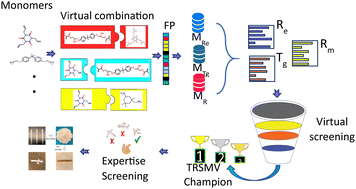Overcoming the barrier: designing novel thermally robust shape memory vitrimers by establishing a new machine learning framework†
Abstract
Shape memory vitrimers (SMVs) are an emerging class of advanced materials that have garnered significant interest from researchers in the past five to six years. These materials can return to their original shape when exposed to a stimulus, while also healing damage they have sustained. However, achieving both high healing/recycling efficiency and a high glass transition temperature (Tg) in SMVs has been challenging, due to the conflicting requirements between molecular chain mobility and the formation and reaction of dynamic covalent bond exchange. Based on the understanding of chemo-physical properties, this study first leverages machine learning (ML), involving supervised and unsupervised learning approaches, to navigate this complex design space of SMVs. Furthermore, we elaborated the basic mathematical frameworks of ML approaches and comprehensively compared their performances. Based on the best performing model, we designed four types of thermally robust shape memory vitrimers (TRSMVs), which boast high recycling efficiency, elevated Tg, and exemplary shape memory effects, overcoming conventional barriers. One of the discovered samples exhibited outstanding performance with a Tg of 233.5 °C, a recycling efficiency of 84.1%, and a recovery stress of 33 MPa in experiments. It aligns well with ML predictions, showcasing the potential of our ML framework in driving innovative materials design and advancing the field of smart polymers.



 Please wait while we load your content...
Please wait while we load your content...